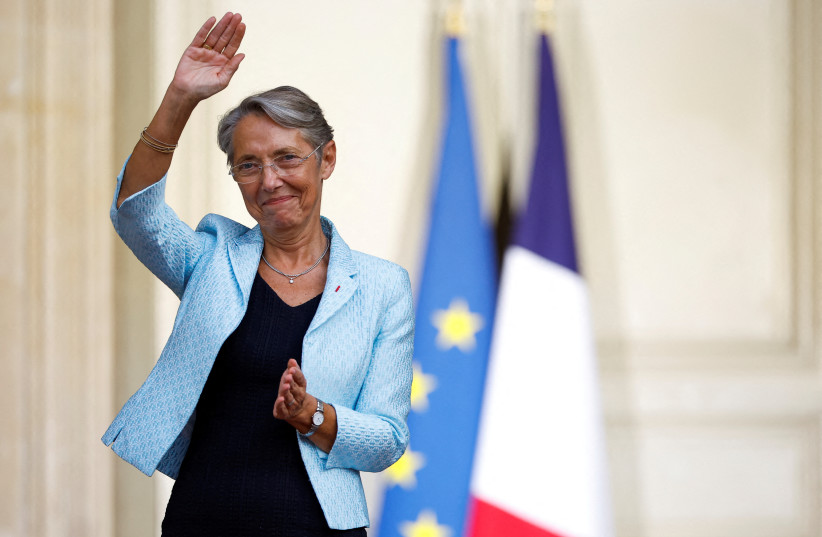French Prime Minister Élisabeth Borne spoke at an event of the Jewish umbrella organization CRIF on Monday and told of her Jewish father’s experiences during the Holocaust. She also revealed that he committed suicide when she was a child. Borne mentioned the day that her father was arrested by the Gestapo in 1943.
"That day, together with my grandfather and my uncles, he was arrested by the Gestapo,” she said. “Then came the sealed wagons, the orders, the beatings, the humiliations.”
Borne said they were prisoners at the Drancy camp in Poland.
“There were 1,250 [people] at the beginning,” she said. “Only six came back. What happened there [at the concentration camp], my father wrote in two letters, which are the only testimony I have from him.”
She continued, “Many books and films have shown this [the Holocaust], but I don’t think anyone can really imagine it. Those who have taken these trains toward the East have seen the abyss to which hatred and the frontiers of humanity could lead.

“For all those who returned, a different life was beginning. Some have succeeded in keeping the taste of hope and faith in life. Others didn’t. I know it only too well.”
The story of Joseph Bornstein
The prime minister’s father, Joseph Bornstein (who later became “Borne”) suffered from trauma and severe depression. According to French media, he committed suicide when Elisabeth was 11 years old.
Borne added that speaking to this group of French Jews “has a particular resonance for me. And our duty is to ensure that history never repeats itself. It means fighting antisemitism with all our strength, wherever it shows itself, wherever it strikes, wherever it hides.”
She acknowledged outgoing CRIF chairman Francis Kalifat for his six years running the organization.
“You fought tirelessly against antisemitism and for the safety of the Jews of France. On behalf of the government, I want to thank you,” Borne said. She also commended the new chairman, Yonathan Arfi, saying, “You now have the task of carrying the voice and the fights of CRIF. I know your energy and your will, your desire to act and your determination.”
She added that she had “one wish: that of working together. Constructive work, which has already begun.”
The French PM mentioned that the number of antisemitic incidents in France during 2022 dropped by more than 25%, compared to 2021, and that there had been a decrease of almost 40% compared to 2019.
“These [statistics] are progress... but as long as there are insults, attacks and murders, we must continue to act,” she said.
Antisemitism today in France
“EVEN TODAY, there is more than one antisemitic incident per day recorded by the police,” Borne said, saying she knows there are many more incidents that aren’t reported. “I know that only represent a small part of reality, because 80% of the incidents do not turn into complaints. Even today, the Jews of France are among the first targets of radical Islam, which threatens you, and thus attacks the entire republic.”
Borne also spoke of the measures that she and her predecessors have taken in order to ensure the safety of Jews across France.
“The results obtained are certainly not a sign that it is necessary to stop. They mean, on the contrary, that we are going in the right direction – and that we must continue.”
The prime minister told the audience that at the initiative of President Emmanuel Macron, “we have totally and resolutely engaged in the fight against Islamist separatism, by equipping ourselves with the tools we needed.” According to the Borne, since 2019, “27 associations that profess hatred have been dissolved.”
She also mentioned the security of synagogues across France.
“We have supported the securing of synagogues, denominational centers, places of memory and education,” Borne said. “Last year, for example, it was the Hazon Ovadia Synagogue in Marseille or the Chné-Or school in Aubervilliers, for which we financed the security.”
She continued, “The number of attacks on places of worship and Jewish graves decreased by 40%. At the same time, we conducted an unprecedented training effort for police and gendarmes, to alert them and better take antisemitism into account.”
Borne noted that the government is continuing its work toward online complaint-filing.
A topic that is very sensitive for the Jewish French community is the brutal killing of Sarah Halimi in 2017. The murder was carried out by a man who not only shouted “Allahu akbar,” he also claimed to have “killed the Satan.” The Jewish community demonstrated for years that the killer, Kobili Traoré, hasn’t faced a proper trial. Traoré was found to be not criminally responsible for the murder because of a psychotic episode brought on by cannabis use.
“The acts committed must be punished,” Borne said. “Everyone here keeps in mind the painful memory of the death of Sarah Halimi. Drug use cannot, must not explain everything or excuse everything. This is why, in a law promulgated last year, we have changed our law to better regulate criminal irresponsibility in the event of the consumption of narcotics.”
She reiterated the commitment that Macron made in 2019, saying, “We have adopted the definition of antisemitism of the International Holocaust Remembrance Alliance. Criticism of Israel as a state and anti-Zionism should never be disguised as hatred.”
Borne concluded that what the Jewish community of France stands for, in her eyes, “is the right to live freely and safely. It is the will to continue to [be part of] writing the future of France.”
